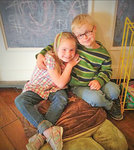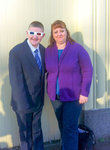

Autism and Asperger Syndrome are often confused to the point of seeming interchangeable to those with a lack of knowledge on the subject.
Both are considered autism spectrum disorders and, though there are subtle differences, the overriding diagnostic criteria that differentiates Asperger’s from Autism is language function. One La Center resident has years of first-hand knowledge as the mother of 13-year-old Michael.
“(He is) high functioning autistic so it’s kind of borderline Asperger’s,’’ Teresa Sharp said of Michael. “They’re very similar, but the only difference between Asperger’s and Autism is Asperger’s doesn’t have language and communication delays.”
Sharp goes on to say that the challenge in dealing with autism spectrum disorders is that the disorder manifests itself differently in every diagnosed individual. Having taught special education for three years while her son was in the early diagnostic stages of his disorder, Sharp approaches Michael from a parental, as well as an academic perspective.
So many aspects can be shared about the journey of a family with special needs children. but maybe above the diagnosis, the therapy, the struggles and the daily sacrifice, where support is found could be equally important. It is in acceptance that these families receive the respectful empathy and grace they aren’t always given while shopping in a grocery story or attending a family wedding.
“I think some of the biggest challenges are social but, when you see it on a day-to-day basis, some days you would never know he has any kind of challenge, but then when he has a melt down people think ‘Oh, he’s a brat,’ ” Sharp said.
For Sharp and Michael, their church has literally been where they find their solace. The Church of Jesus Christ of Latter Day Saints, located in Ridgefield, has a disability coordinator. The church has also recently offered a class to every adult about understanding how to work with people with disabilities. There, Sharp says, the congregation accepts him the way he is and are always asking her what they can do to help him, to relate with him and to make him feel comfortable and safe.
For Michael, this church is doing more than feeding his spiritual needs. It’s meeting the social needs which are particularly important for people with autism spectrum disorders. Michael is also a member of the Boy Scouts of America church troop. Sharp shared that experience is helping him learn independence and many other life skills. He attends week-long campouts every summer, which is a big step for any child but for the parent of a child with Autism, who is challenged in most social interaction and changes to their routine and schedules, it is a leap of faith. In return, the scout leaders hold a debriefing after each outing to improve the experience for the following year.
Battle Ground residents Bryan and Renee Erickson can relate to some of what Sharp deals with, but as Sharp pointed out, every child with special needs is different. At 51 years old, Renee had already mothered seven children and was a grandmother to nine. On the day she found out that she was pregnant with her eighth, her fifth child called to tell Renee that he and his wife were going to have their first baby. No one believed that Renee could be pregnant. Her daughter, Leah, was born with Down syndrome and has since been diagnosed with Autism and displays signs of obsessive-compulsive disorder (OCD).
“I was just in shock over having a baby but I knew we were high risk so I was preparing my mind for it,’’ Renee said. “I figured it out before they told us. I could tell.”
Six weeks away from 52, Renee didn’t think she’d have the energy or the strength to bare or nurse another child. But then she considered a couple close family members with Down syndrome babies. On her husband’s side, his sister had a son and on Renee’s side Leah would have a first cousin just two years older than her. Both of these boys were fun, adorable and easy in Renee’s estimation.
“Her special needs are not just Down syndrome,’’ Renee said. “Because of this Autistic/OCD aspect, she’s obsessed with things, which isn’t something she can control. When she sees a garbage can, she can’t help but throw things in it - things that aren’t meant to be thrown away.”
The one thing they’re learning is that forcing Leah to behave how they or someone else feels she should will not result in compliance. Love has to be involved, Renee says, and if a technique doesn’t work, frustration and anger, as natural as those reactions are, are not options.
Tukes Valley Primary School has been a good fit for Leah. According to Renee, the special education teacher there, Kelly Gorby, came highly recommended. If something doesn’t resonate with Leah one day, Gorby will go back to the drawing table and come back the next morning with another approach.
Another resource that Renee swears by is the Love and Learning reading program, which was developed by the father of a Down syndrome child. She says every child with Down syndrome should be using this program along with a PBS show called Signing Time with Alex and Leah. Through both of these tools, their Leah had a strong foundation of the written word, signing and music to prepare her for kindergarten.
Echoing Sharp’s observations, Renee said, “The most difficult thing about her, that would be nice if people around me understood, is the unpredictability of everything. You go into a situation and there’s people around and she wants to push the cart fast and it looks like an undisciplined child.”
Sharp shared the story of a young woman named Carly Fleischmann who’s completely nonverbal but now a college student who communicates via her iPad. She co-wrote her story Carly’s Voice: Breaking Through Autism.
“If you can just learn how to communicate with them and speak their language you understand them so much more and can learn from them,” Sharp said. “It takes more work but everyone is so very different.”